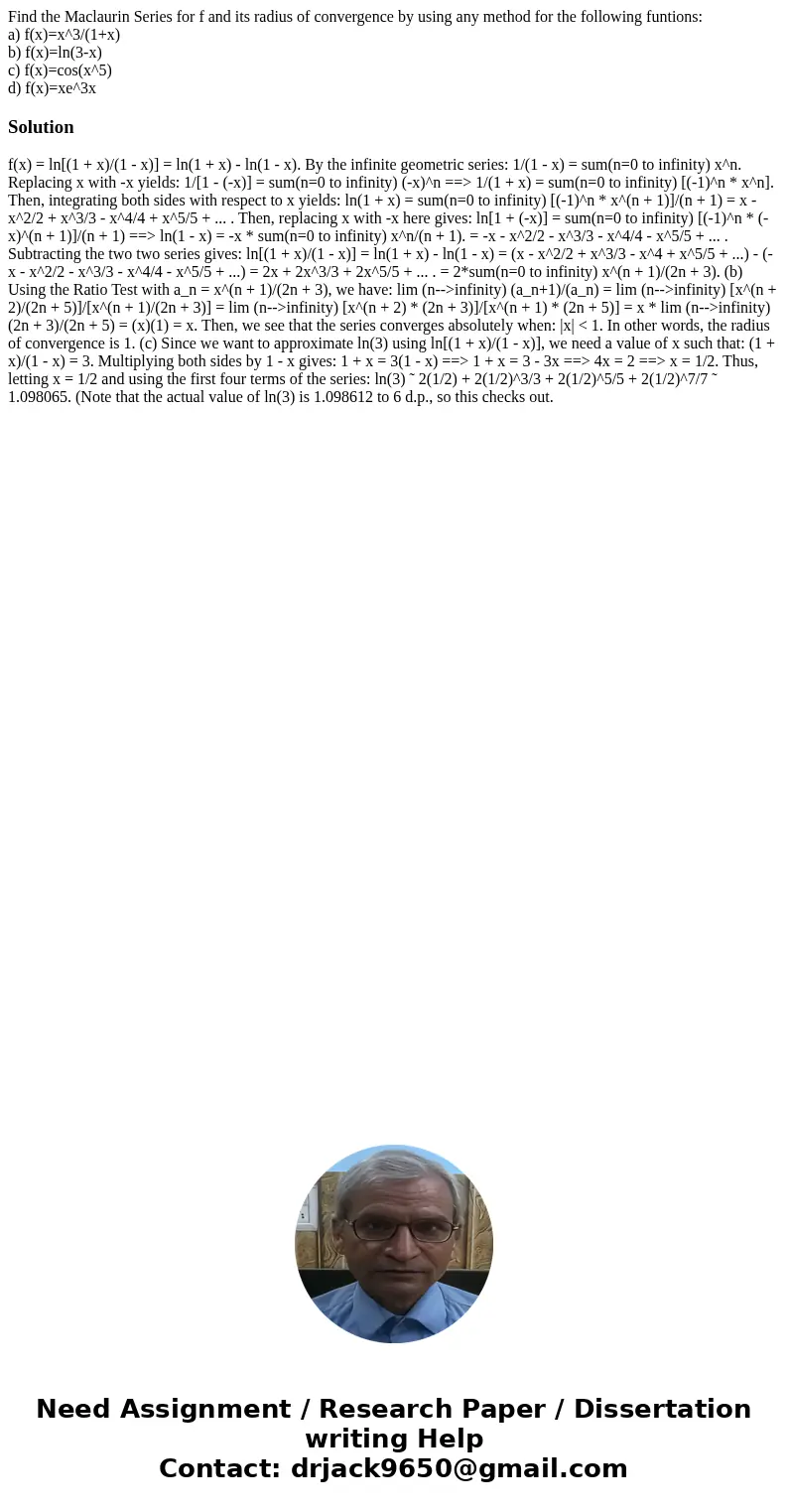Find the Maclaurin Series for f and its radius of convergenc
Find the Maclaurin Series for f and its radius of convergence by using any method for the following funtions:
a) f(x)=x^3/(1+x)
b) f(x)=ln(3-x)
c) f(x)=cos(x^5)
d) f(x)=xe^3x
a) f(x)=x^3/(1+x)
b) f(x)=ln(3-x)
c) f(x)=cos(x^5)
d) f(x)=xe^3x
Solution
f(x) = ln[(1 + x)/(1 - x)] = ln(1 + x) - ln(1 - x). By the infinite geometric series: 1/(1 - x) = sum(n=0 to infinity) x^n. Replacing x with -x yields: 1/[1 - (-x)] = sum(n=0 to infinity) (-x)^n ==> 1/(1 + x) = sum(n=0 to infinity) [(-1)^n * x^n]. Then, integrating both sides with respect to x yields: ln(1 + x) = sum(n=0 to infinity) [(-1)^n * x^(n + 1)]/(n + 1) = x - x^2/2 + x^3/3 - x^4/4 + x^5/5 + ... . Then, replacing x with -x here gives: ln[1 + (-x)] = sum(n=0 to infinity) [(-1)^n * (-x)^(n + 1)]/(n + 1) ==> ln(1 - x) = -x * sum(n=0 to infinity) x^n/(n + 1). = -x - x^2/2 - x^3/3 - x^4/4 - x^5/5 + ... . Subtracting the two two series gives: ln[(1 + x)/(1 - x)] = ln(1 + x) - ln(1 - x) = (x - x^2/2 + x^3/3 - x^4 + x^5/5 + ...) - (-x - x^2/2 - x^3/3 - x^4/4 - x^5/5 + ...) = 2x + 2x^3/3 + 2x^5/5 + ... . = 2*sum(n=0 to infinity) x^(n + 1)/(2n + 3). (b) Using the Ratio Test with a_n = x^(n + 1)/(2n + 3), we have: lim (n-->infinity) (a_n+1)/(a_n) = lim (n-->infinity) [x^(n + 2)/(2n + 5)]/[x^(n + 1)/(2n + 3)] = lim (n-->infinity) [x^(n + 2) * (2n + 3)]/[x^(n + 1) * (2n + 5)] = x * lim (n-->infinity) (2n + 3)/(2n + 5) = (x)(1) = x. Then, we see that the series converges absolutely when: |x| < 1. In other words, the radius of convergence is 1. (c) Since we want to approximate ln(3) using ln[(1 + x)/(1 - x)], we need a value of x such that: (1 + x)/(1 - x) = 3. Multiplying both sides by 1 - x gives: 1 + x = 3(1 - x) ==> 1 + x = 3 - 3x ==> 4x = 2 ==> x = 1/2. Thus, letting x = 1/2 and using the first four terms of the series: ln(3) ˜ 2(1/2) + 2(1/2)^3/3 + 2(1/2)^5/5 + 2(1/2)^7/7 ˜ 1.098065. (Note that the actual value of ln(3) is 1.098612 to 6 d.p., so this checks out.
 Homework Sourse
Homework Sourse